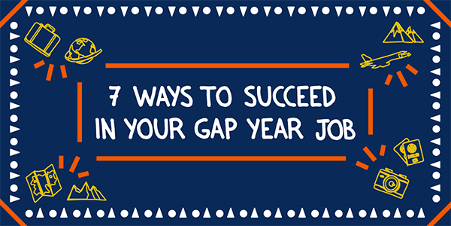
This piece was written by freelance writer and filmmaker Priyanka Mogul.
Gap years have been the latest fad for a few years now, but how do you take one and make it count for something?
I took a gap year back in 2011 before starting my journalism degree at university. I was lucky enough at the time to have a careers counsellor who convinced me of the importance of doing something useful during my year off, rather than just travelling for the sake of it.
That doesn’t mean you shouldn’t travel. I travelled and it was amazing. But I also made sure that I had work experience lined up in each country I visited. Immersing yourself into a career at such a young age – and during such an exciting time – is daunting. Even more so when you’re in a new country and learning to adapt to a new culture. But it can be done, and if it’s done right, it can be one of the most rewarding things you will ever do – personally, as well as professionally.
1. Find something appropriate
The best kind of job to get during your gap year is one that is relevant to your future career. These are definitely harder to find, but it’s worth the effort. There is little point spending your gap year working as a bartender or waitress just because it allows you to be in a new country (unless, of course, you see a future in bartending or hospitality). Find a job in a new country that is also related to what you want to study or do with your life.
During my gap year, I made sure that all the work experience I was getting was related to journalism. I knew that this would increase my chances of getting into a good journalism programme at university after my gap year, but it was also a good chance for me to get a taste of the industry before I committed myself to it at university level.
I started out my gap year in Cape Town, South Africa, working for a magazine called Cape Chameleon. I found them through a gap year organisation called Projects Abroad (who also do international placements for people interested in other sectors). It was awesome to be experiencing a new country, while also getting extremely relevant work experience that would later help me progress in my chosen career path.
2. Take it seriously
A lot of people get caught up with being in a new country and forget to take their jobs as seriously as they probably should. While I was in South Africa, it was easy to get tempted to blow off work and go sightseeing or to the beach. I had to keep reminding myself why I was doing this gap year and what I was trying to get out of it.
It’s important to appreciate the organisation that has taken a chance on you and make sure you are putting in the work. Just because it isn’t a real job with long-term prospects, doesn’t mean you shouldn’t treat it as one. These are the first connections you will make in your industry; your colleagues and bosses might even know people back in your own city. They’re much more likely to make an introduction if you impress them. And who knows, you might end up wanting to work there permanently in the future.
3. Do your research
Work ethics across the globe can be very different. You’ll find it much easier to fit into your new work environment if you’ve already done some research on the country you are going to be working in. Familiarise yourself with the culture and practices of the country. Not only will it tell you what sort of office atmosphere you’re about to walk into, but it’ll also help you bond with your new colleagues.
Apart from that, it’s also extremely important that you do your research on the organisation you are going to be working with. It might just be a short-term experience for your gap year, but you will be much better at your job if you already know the ins and outs of the company. Your new boss and colleagues will appreciate not having to explain the basics to you and will acknowledge the effort you have put in. Make sure you’re prepared – they’re more likely to take you seriously as an employee if you are (and give you more serious things to work on).
4. Ask questions
Having said that, don’t be afraid to ask questions if you need to. Your gap year is the perfect time for you to ask any question without being judged for it. This is your time to learn as much as you can before you start the rest of your career. Make the most of the opportunity.
While working at magazines in South Africa, India and London during my gap year, I had easy access to journalists who had been in the industry for years. So apart from asking all the questions I could possibly ask about the jobs I was given, I also asked them as much as I could about the industry I was about to enter. Is a journalism degree necessary to break into the field? What does an average day in a newsroom look like? What are the different sorts of roles I could perform within a newsroom? I used the opportunity and the people around me to learn as much about journalism as I possibly could before starting university. During the first year of my degree, I definitely felt the positive effects of all those questions.
5. Experiment
This is something I wish I had done more of during my gap year jobs. I was so fixed on what sort of a journalist I thought I wanted to be that I ignored tasks and opportunities that would encourage me to dive into other aspects of the industry. This was a big mistake.
I thought I wanted to be a feature journalist who reports primarily on women’s rights, so I ignored opportunities to work on the news and sports desks. Use your gap year job to trial different roles within the sector; or maybe even trial different sectors! My gap year would have been a great opportunity to test the waters in communications and PR.
Make sure you step out of your comfort zone. What you think you want for yourself and your career isn’t necessarily going to be the same in five years (in fact, it’s almost certainly going to be something different).
6. Immerse yourself in your surroundings
When a colleague asks whether you want to go with them for lunch, say yes. This is just as important as doing well professionally within your new role.
I spent a lot of time ignoring the people around me because I was so focused on perfecting the tasks given to me. The one time I did go on a lunch break with colleagues, or when I stopped to speak to protesters on my way to work – even though it made me late that morning – were the times when I stumbled upon a new idea to pitch at work. And those ideas were what helped put me on the map within the office.
Spend time getting to know the people outside the office. It’s through them that you will understand your host country, and it’s through that understanding that you will get better at your new job. Make the most out of every opportunity that is presented to you. You never know where or what it will lead to.
7. Leave your mark
This is the hardest part, but it’s important to leave your mark. Don’t be another international kid who comes in for a few months and then leaves with no trace.
Put in the work and leave behind something tangible. Pitch new ideas and change the way something is done in the office. You’ll always be remembered for it – even if you don’t ever go back to the country again. More than doing it for them, do it for yourself. Gap years have become synonymous with a bunch of young people doing things without meaning. Your time and money is precious – and your gap year shouldn’t be a waste of either of them. Figure out a way to leave your mark – on the place you have visited, as well as on yourself.
